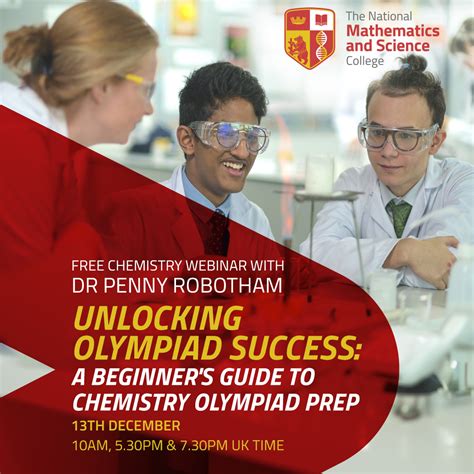The Science Olympiad is a prestigious academic competition that challenges high school students in various scientific disciplines, including chemistry. The chem lab is a crucial component of the competition, requiring students to demonstrate their practical skills and theoretical knowledge. This comprehensive guide will provide you with all the essential information and strategies to excel in the Science Olympiad chem lab.

Understanding the Competition
The Science Olympiad chem lab consists of two parts:
1. Lab Practical: In this section, students perform a series of experiments that test their hands-on skills and understanding of chemical principles.
2. Written Exam: This exam evaluates students’ theoretical knowledge of chemistry, including topics such as stoichiometry, equilibrium, and thermodynamics.
Preparation Strategies
1. Study the Content: Thoroughly review the official Science Olympiad syllabus and make sure you have a strong foundation in all the required chemistry concepts.
2. Practice Experiments: Familiarise yourself with the experiments in the lab practical by practicing them in advance. This will help you develop essential techniques and build confidence.
3. Review Relevant Safety Protocols: Ensure that you are familiar with the safety procedures for the lab. Follow all protocols strictly to avoid any accidents or injuries.
4. Time Management: Effectively managing your time is crucial in the lab practical. Plan out your steps in advance and prioritise tasks to maximise your efficiency.
5. Study Previous Exams: Analyse past Science Olympiad chem lab exams to gain insights into the exam format and recurring themes.
Common Mistakes to Avoid
1. Not Reading Instructions Carefully: Ensure you thoroughly understand the instructions for each experiment before proceeding. Misinterpretations can lead to inaccurate results or wasted time.
2. Ignoring Safety Precautions: Do not compromise on safety. Wear appropriate protective gear and follow all safety protocols to prevent accidents.
3. Poor Technique: Use proper techniques during experiments to obtain precise results. Avoid spills, contamination, or incorrect measurements.
4. Rushing Through the Exam: While time management is important, accuracy is paramount. Do not rush through the exam; take your time and ensure your answers are clear and correct.
5. Neglecting the Written Exam: Pay equal attention to both the lab practical and the written exam. The written exam assesses your theoretical knowledge, which is vital for overall success.
FAQs
1. What are the most important topics to focus on?
- Stoichiometry
- Equilibrium
- Thermodynamics
- Acid-Base Chemistry
- Electrochemistry
2. How long should I spend preparing for the exam?
- Start preparing at least 4-6 months in advance.
3. Where can I find practice materials?
- The Science Olympiad website
- Science Olympiad textbooks
- Online forums and resources
4. What is the “creativate” concept?
- The “creativate” concept is a novel term used to describe ideas for new and innovative applications of chemistry.
5. How can I improve my problem-solving abilities?
- Practice solving chemistry problems regularly.
- Analyse past Science Olympiad exams to understand the types of problems you may encounter.
- Seek guidance from teachers or mentors to develop your problem-solving skills.
6. What are some tips for success?
- Stay organised and manage your time effectively.
- Be meticulous in your experiments and record your observations accurately.
- Seek help from mentors or teachers when needed.
- Stay positive and believe in yourself.
Table 1: Essential Chemistry Concepts
| Concept | Importance |
|---|---|
| Stoichiometry | Calculating the amounts of reactants and products involved in chemical reactions |
| Equilibrium | Understanding the balance between chemical reactions and the formation of products |
| Thermodynamics | Studying the energy changes in chemical reactions and the spontaneity of processes |
| Acid-Base Chemistry | Investigating the properties and reactions of acids and bases |
| Electrochemistry | Examining the relationship between chemical and electrical processes |
Table 2: Common Lab Experiments
| Experiment | Skills Assessed |
|---|---|
| Titration | Measuring the concentration of unknown solutions |
| Spectrophotometry | Determining the concentration of solutions using light absorption |
| Calorimetry | Measuring heat changes in chemical reactions |
| Gas Laws | Investigating the behaviour of gases under various conditions |
| Chromatography | Separating and identifying different components of mixtures |
Table 3: Safety Precautions in the Chem Lab
| Precaution | Significance |
|---|---|
| Wearing Safety Gear | Protecting yourself from chemical spills, splashes, and fumes |
| Following Lab Protocols | Ensuring proper handling and disposal of chemicals |
| Handling Chemicals Carefully | Preventing accidents and contamination |
| Being Aware of Your Surroundings | Avoiding potential hazards in the lab |
| Reporting Accidents or Spills Immediately | Seeking prompt medical assistance or cleanup |
Table 4: Exam Preparation Tips
| Strategy | Benefits |
|---|---|
| Reviewing Past Exams | Gaining insights into exam format and recurring themes |
| Practicing Regularly | Building confidence and improving problem-solving skills |
| Timed Practice | Enhancing time management abilities |
| Collaborating with Peers | Sharing knowledge and learning from others |
| Seeking Guidance from Experts | Clarifying concepts and developing analytical skills |
By following these strategies and adhering to the provided tips, you can significantly increase your chances of success in the Science Olympiad chem lab. Remember to stay focused, stay organised, and never stop learning. The pursuit of scientific knowledge is a never-ending journey, and the Science Olympiad is an excellent platform to showcase your abilities and passion for chemistry.
